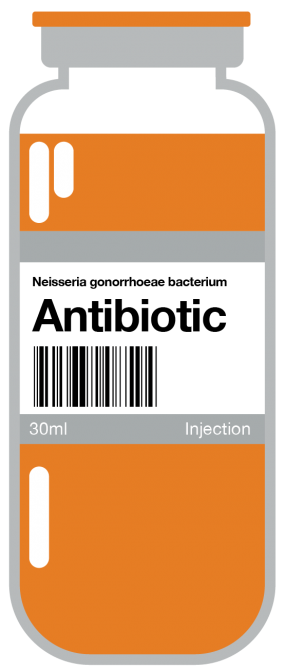Drug-Resistant Gonorrhea: A Public Health Threat
HTML Infographic
People who are sexually active can get gonorrhea, a common sexually transmitted infection (STI) that can affect the genitals, rectum, and throat. It can be treated and cured, but it is highly skilled at outsmarting the antibiotics used to treat it.
Drug resistance, also referred to as antimicrobial resistance, happens when germs like bacteria and fungi develop the ability to resist, and even defeat, the drugs designed to kill them. That means the germs are not killed and continue to grow. The bacteria that cause gonorrhea has grown resistant to nearly every drug ever used to treat it, and it’s only a matter of time until it becomes resistant to the last available cure.

Gonorrhea is the second most commonly reported bacterial infection in the United States.

CDC estimates that 1.6 million new gonorrhea infections occur each year, and that half of those infections are resistant to at least one antibiotic.

Today, the United States has just one recommended gonorrhea treatment option remaining.
Honest and open conversations, both with your provider and sexual partner(s), are an important part of keeping yourself and your partner(s) safe from infection.
Ask to Get Tested for STIs
The sooner you are treated for an STI, the less chance an infection will impact other parts of your health.
Be Open and Honest
Knowing your sexual history and any symptoms you have will help your provider to provide the best possible treatment.
Find the Right Healthcare Provider
It’s important to feel comfortable and heard, so take the time to find the right fit for you.

Don’t Be Afraid to Ask Questions
The more aware you are of how to prevent infections, the better prepared you will be.
Consider Expedited Partner Therapy (EPT)
If you are concerned your partner has an infection, talk to your provider about EPT, allowing them to receive treatment without evaluation.

Be Open and Honest
Be clear with your partner about the number of sexual partners you have.
Ask When They Were Last Tested
Find out when they were last tested for STIs.
Let Them Know
Tell your partner if you have an STI (like gonorrhea or HIV), even if you’re currently taking medicine to treat those infections.
Don’t Avoid the Conversation
Talk with your partner(s) BEFORE having sex so you can both make informed choices about your sexual health.
Be Understanding
Being respectful and nonjudgmental can create the space for a more productive conversation, and if you want, lay the groundwork to keep those conversations going.
Visit Get Tested to find free, fast, and confidential testing near you.